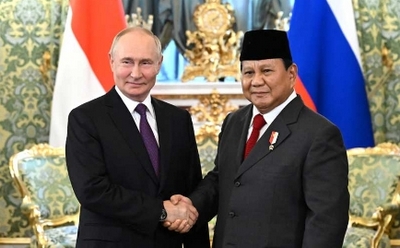The fact that Thailand, Vietnam and Malaysia were also designated “partner countries” at the Kazan Summit last October suggests Russia’s ‘Near Abroad’ may be expanding to Southeast Asia.
During Russia’s 2024 chairmanship of BRICS – a semi-formal intergovernmental bloc comprising key emerging markets and widely considered the Global South’s answer to the Group of Seven (G7) advanced economies – four ASEAN states had been offered ‘partnership status’ in lieu of direct entry. Whereas Vietnam remains in “wait-and-see” mode, Thailand and Malaysia rushed headlong into affiliating themselves with the non-Western alliance soon after invitations were extended their way. Meanwhile and somewhat unexpectedly, Indonesia became a full-fledged BRICS member earlier this week despite Russian Foreign Minister Sergey Lavrov announcing an “enlargement moratorium” six months ago in order to assimilate the previous batch of entrants.
With Saudi Arabia still dragging its feet on accession talks, tensions simmering between Türkiye and Russia over recently toppled Syrian dictator Bashar al-Assad and Kazakhstan ruling out BRICS membership, Indonesia was admittedly among the few ‘middle powers’ left to join the group in short order. That said, the country’s newly-elected strongman, Prabowo Subianto in whom the Kremlin doubtless sees a like-minded, no-nonsense ally, almost certainly had a bearing on its fast-track admission to BRICS. Although the revolving door of retired army generals being thrust into frontline politics is par for the course across Southeast Asia, Subianto’s ascent to power was especially auspicious for Russia since his October inauguration coincided with the 16th Annual BRICS Forum in Kazan that was billed as an earth-shattering Bandung 2.0 symposium.
Notwithstanding his domestic and international reputation as a ‘walking crime wave’ whose egregious behavior and flagrant human rights abuses earned him a 20-year U.S. travel ban, the current incumbent attempted to reassure ordinary Indonesians that he has changed his spots by pulling numerous publicity stunts like launching a $4 billion ‘free meals’ scheme for schoolchildren and masquerading as a ‘cat-lover’ on social media. Interestingly, however, his predecessor and two-time presidential rival, Joko Widodo campaigned on a similar, albeit less ostentatious, “man of the people” ticket when he first ran for office, only to do away with virtually all checks and balances during his decade-long tenure in charge and become fantastically corrupt.
Having referred to democracy as “tiring” and “messy,” one cannot picture Subianto as anything other than an autocrat-in-waiting bent on applying the finishing touches to what he deems a ‘failed social experiment’ and ushering in an era of retrograde, junta-inspired governance. Over and above his chequered past as an acolyte of the bloodthirsty Suharto regime, who was discharged from the military for kidnapping and roughing up civil society activists, the 72-year-old made no bones about his pro-Russia stance while serving as defense minister under Widodo’s prior administration. For starters, Indonesia refused to endorse the final communiqué at the 2024 Peace Conference in Switzerland, citing the need for more “inclusive dialogue” with the Kremlin.
Shortly thereafter, on July 31st, Subianto was received by and went out of his way to ingratiate himself with Vladimir Putin in Moscow – describing Russia as a “great friend.” It was at this meeting that he also proposed launching non-stop Aeroflot flights to Bali, earmarking a scholarship fund for 160,000 Indonesian medical students to pursue higher education in Russia, and intensifying cooperation with Rosatom. Moreover, hisfirst overseas trip as head of state was to China, where bilateral trade deals worth $10 billion were reached. Irrespective, Russia will likely be the main beneficiary of Indonesia’s shift to tyrannical rule under its new commander-in-chief.
The Indonesian masses are not only highly sceptical of Subianto’s authoritarian streak but also of the very legitimacy of his election victory. Should he revert back to his old ways and immiserate those who oppose him, Indonesia risks plunging into the kind of chaos Russia has thrived on in the likes of Syria and Myanmar. Putin, in particular, is more than happy to expend political capital and financial resources on keeping rogue governments in the developing world afloat and package organic uprisings as U.S.-instigated color revolutions. Indonesia, in this regard, is ripe for the picking. Any instability emanating from the grassroots’ disillusionment with Subianto will inevitably be framed by state-backed Russian propagandists as a “BRICS versus Collective West” proxy war. Jakarta, in turn, is bound to throw its full weight behind Moscow at the United Nations.
Opaque as BRICS’ intake procedure might appear, the bloc’s founding members have sought to create the impression that aspirants must go through the motions and cannot be admitted on a ‘luck of the draw’ basis or at the whim of any single participant. Yet in Indonesia’s case, Russia was clearly the driving force behind seeing them through and gift-wrapping their scandal-ridden leader a major diplomatic win early into his presidency. Granted, Indonesia is a regional powerhouse in its own right and a worthy contender to make the cut on merit alone, given its strategic location, abundant mineral reserves, OECD candidacy, and independent “bebas dan aktif” foreign policy doctrine as one of the originators of the 1961 Non-Aligned Movement (NAM).
Nonetheless, the debt of gratitude Jakarta now owes Moscow for getting it past the finish line begs the question as to what an agenda-driven Putin is expecting in return. Boasting a 280-million-strong population with a median age of just 30, the world’s largest archipelagic state could become a hotbed for Kremlin-led mercenary recruitment as the war in Ukraine grinds on. For the ex-KGB agent, the best-case scenario would be establishing a North Korea-esque “cannon fodder for food security” arrangement with his opposite number whereby able-bodied Indonesians are brought in on the sly and passed off as ethnic Buryats to afford both parties plausible deniability.
Needless to say, Moscow’s acute manpower deficit is not solely confined to the battlefront. Besides the unprecedented exodus of its best and brightest youth engendered by the full-scale invasion of Ukraine, Central Asian guest workers are increasingly beginning to second-guess their future in wartime Russia following the March 22nd Crocus City Hall Terrorist Attack perpetrated by four Tajik assailants and more recently, the Uzbek suspect accused of killing Lieutenant General Igor Kirillov. The climate of fear and xenophobia is such that even remittance-dependent ex-USSR republics like Kyrgyzstan and Tajikistan have warned their citizens against taking up work in Russia.
To fill the ensuing void in labor-intensive industries – namely agriculture, mining, and construction – the Kremlin could end up sourcing blue-collar workers at scale from the ASEAN region. On the people-to-people front, it is no secret that the countries of Southeast Asia welcome Russian visitors and long-term residents alike with open arms and without any preconceptions. Lax entry requirements, year-round warm weather, sinfully low living costs, and politically unaware locals who routinely mistake them for Europeans have fueled the influx of draft dodgers as well as ‘digital nomads’ from Russia to places such as Bali, Phuket and Pattaya.
This differs starkly from the mood in the post-Soviet space where immigration authorities are taking a much harder line vis-à-vis Russian ‘relokants’. Azerbaijan recently capped the maximum length of time citizens of Russia can spend on its territory visa-free at 90 days per calendar year while keeping its land borders closed to ostensibly prevent the post-mobilization demographic transformation that has taken root in neighboring Georgia and Armenia. Kazakhstan introduced similar legislation back in 2023 aimed at ending the prolonged stay of non-resident Russians. It also plans to ramp up crude exports via the Baku-Tbilisi-Ceyhan (BTC) pipeline thirteen-fold as a means of reducing transit reliance on Russia, through which more than 80% of its oil flows pass.
Armenia, on the other hand, has repeatedly hinted at leaving the Russian-led Collective Security Treaty Organization (CSTO) and, in a further affront to its former colonizer, just approved a draft bill to kickstart EU membership negotiations. Amid waning influence in its own ‘backyard,’ Russia is collaborating more closely with ASEAN in the hope that the 10-member association continues to remain neutral and avoid enforcing Western sanctions. As far as Putin is concerned, bringing Indonesia into the BRICS fold will not only help ensure the current status quo is maintained but also offer neighboring applicants such as Thailand, Malaysia, and Vietnam cause for optimism.
by Saahil Menon
Credits: moderndiplomacy.eu

